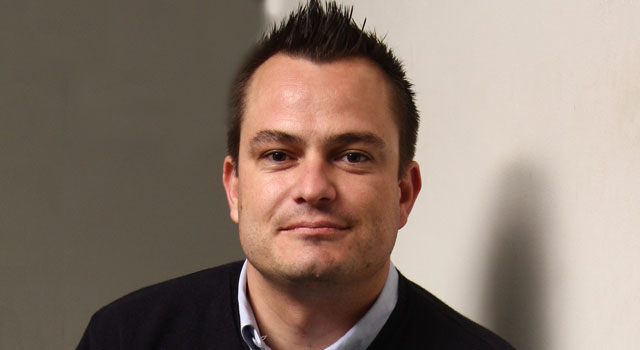
A thick Australian accent belies the fact that digital agency Quirk’s CEO, 37-year-old Justin Spratt, is a South African and African at heart. “I f***ing love this place,” he says colourfully when I meet with him at the company’s Sandton offices.
“I’m exceptionally passionate about Africa in general,” he quickly adds. “There are a hell of a lot of opportunities here — and a shitload of fun to be had.”
Spratt’s father is Australian and his mother South African. When his mom divorced and returned to South Africa, he came with her to help her get settled.
“My tech thread started around the age of 10,” he remembers, as the interview gets under way properly. “My dad worked for IBM and my mom worked as a trainer for Microsoft. We had one of the first 10 PCs in Australia in our house. I got interested in Basic programming and played lots of the early games like King’s Quest and Age of Empires.”
When he crossed the Indian Ocean to South Africa, Spratty, as he’s called affectionately by his mates and colleagues, had only recently finished school and was a professional bodyboarder, complete with sponsorships.
He’d planned to study in Durban, but riots over enrolments, and the fact that he had a cousin in Pietermaritzburg, saw him enrol in Sleepy Hollow instead for a degree in finance and economics. Weekends were spent with friends in Durban, where he spent much of his time surfing. An honours degree, specialising in derivatives, followed, and with that a job at Morgan Stanley in London, where he worked in credit derivatives for technology companies.
When he “retired” from investment banking and returned to South Africa, he started a business called Network Box, specialising in firewall software. Within 18 months he sold it to Business Connexion, a JSE-listed IT firm.
His next stop was Internet Solutions, part of Dimension Data. While there, then-CEO Angus MacRobert — who Spratt refers to as his “business mentor” — asked him to go into sales, “which no product manager ever wants to do”. But he accepted, heading up one of the company’s largest portfolios, including its account with Absa.
Spratt also ran the Wi-Fi business unit, AlwaysOn. At the time, Internet Solutions didn’t see Wi-Fi amounting to much, Spratt says. “But I realised it was a huge business, especially in Africa. It wasn’t just about coffee shops. It was clearly going to be very lucrative and you didn’t need a special licence for it.”
At his prompting, Internet Solutions bought a controlling stake in AlwaysOn.
As wireless grew in importance, the company created a fixed-mobile convergence unit to capitalise on the possibilities of voice-over-Internet protocol (VoIP) services and the cost-saving benefits it offered large corporate customers. “That whole business model has been shot because mobile network operators have brought down the interconnect fee.”
Interconnection fees are what operators charge one another to field calls over their networks. In the early days of mobile networks, the rate was high and it kept call costs high. This meant the chance to route people’s calls over their company Wi-Fi using VoIP was potentially big business.”
Though the VoIP business didn’t meet expectations, Spratt says it was fun to be involved in its development. “We got to play with some amazing bleeding-edge tech. All kudos to Angus MacRobert: he signed off on those sorts of projects and he pushed us and gave us budget to really do blue-sky thinking.”
Spratt first met Quirk founder Rob Stokes at one of the GeekRetreat events he, Spratt, co-founded with South African Heather Ford, who now works at Google. He says it took about a year to iron out a deal with Stokes before he decided to quit Internet Solutions. He wasn’t an obvious candidate for the digital agency given his lack of advertising and marketing experience.
“Rob wanted more of a tech focus, but also needed someone who could give Quirk some serious business management love. Any MBA hired gun could have done it, but [Cape Town-based] Rob said I had a fairly good network in Johannesburg.”
When Spratt started at Quirk three years ago, he was hired to run its Johannesburg office – it also has offices in Cape Town and London – and it employed eight people. This has grown to 80 with a several-fold increase in sales. The focus is now on expanding elsewhere in Africa, starting with Kenya and Nigeria. “Rob’s the real star in all of this. He founded the business and he pushes us into really crazy business ideas that most of us think are crazy but that end up working.”
A passion for start-ups
Spratt has a passion for start-ups and Web-based tech companies. This, he says, inspired him to found IS Labs at Internet Solutions, a project to “help make the Internet better in South Africa”. IS Labs is now supporting Jozi Hub, a start-up accelerator and shared working space in Johannesburg that wants to emulate the success of technology hubs like those in Kenya.
“It gave me something else interesting to put on my CV,” Spratt tells me. “It brought my finance and tech backgrounds together. I guess my end goal five years from now is to have some kind of private equity vehicle funding tech companies in South Africa. I love Web tech, I love business, and I understand how to finance these things.”
Spratt mentors a number of start-ups and is helps out with TechInBraam, a new technology “cluster” being established in Juta Street in Braamfontein, Johannesburg in facilities bought by Wits University.
As if that isn’t enough, Spratt is also an advisor and mentor for start-up accelerator Seed Engine and sits on a number of investment committees. Plus, he owns shares in open-source software specialist Synaq.
Money has never been a primary motivator, Spratt says. Instead, he says he subscribes to this mantra: “Do great shit and the money will come.”
“In Africa, there’s a load of opportunities to do cool stuff. There are probably only three places that you can do that: the Far East, South America and Africa. What excites me about Africa is it’s the least favoured of those three regions for now. You don’t want to follow the smart money after the fact. You want to take a bet on where the smart money will be.”
A petri dish of experimentation
Spratt and his wife, Jackie Scala, married at the end of last year and are expecting their first child in May. An occasional snowboarder who still sometimes finds time to surf, he also did Taekwondo for about eight years. “That was when I weighed 80kg, not 100kg. Now I sink on a body board and can’t get my leg above my knee.”
When he’s not leading the Quirk team, Spratt likes to read about geopolitics, macroeconomics and history. He describes himself as a “fairly strong libertarian” who favours small government.
“What interests me about business is that it’s a microcosm of society and culture. A business is like a petri dish where I can experiment.”
Spratt says one of the most important things he’s learnt in business is that people suffer from what he calls “fundamental attribution error” — they try to make heroes out of people and attribute success too much to individuals.
“That’s not me,” he insists, as the interview winds up. “This has been a partnership with Rob. If I have any talent, it’s that I find the right people to work with me. I believe deeply that it’s the sum of the parts. Any success I have is because of my ability to work with really great people.” — (c) 2013 NewsCentral Media




